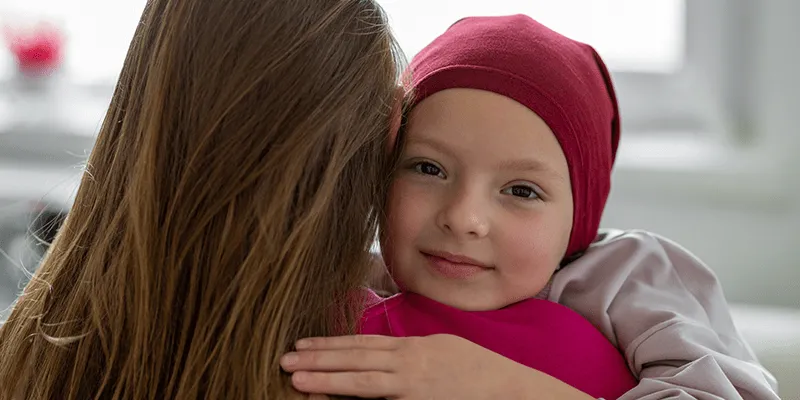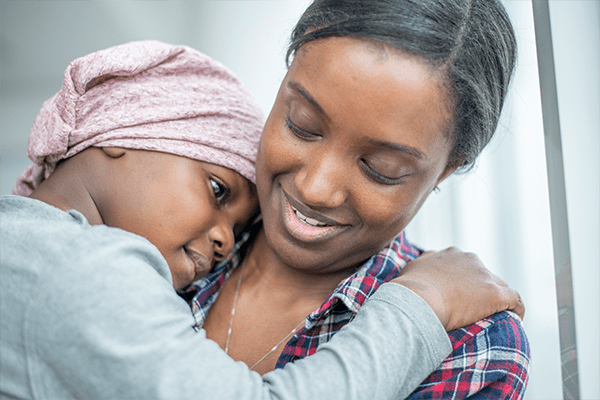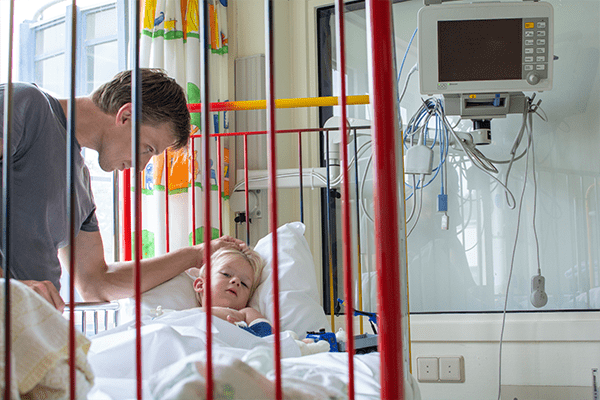Co-Parenting a Child with Cancer
4 ways to help you co-parent after a childhood cancer diagnosis.
- 5 min read
- custody
- health & wellness

Co-parenting after a separation or divorce can be difficult, but some parents have to deal with an additional, unimaginable hardship if their child is diagnosed with cancer. With this diagnosis, your child’s life is affected significantly, and everyone in the family may experience shock, sadness, or even anger. Even though your child’s illness will have a significant impact on all your lives, doing your best to co-parent effectively for the sake of your child is paramount.
Focusing your efforts on your child’s best interests in these difficult circumstances can make things smoother for you, your co-parent, and most importantly, your child. Although you and your co-parent should try multiple methods and find what works best for your situation, these tips can give you both a head start on being the best, most supportive parents you can be throughout this tough time.
How to navigate co-parenting and childhood cancer
Support your child
After receiving a cancer diagnosis, your child can experience a wide range of feelings, from disbelief to overwhelming anxiety. Depending on their age, the American Cancer Society says children can exhibit various behaviors as part of their emotional reaction to the effects of their diagnosis and treatment.
While a child processes their diagnosis and the effect of their treatment on their life, they are likely to:
- Be fearful when separated from their parents
- Withdraw from interactions with others
- Act out by throwing tantrums or yelling
- Ask many questions about procedures, treatments, and their condition
- Miss being at school with their classmates
- Worry that they caused their cancer
- Show sadness and anger over their loss of health and everyday normalcy
- Feel their independence is compromised
Regardless of what behaviors and feelings your child exhibits and expresses, validate their experience. Ensure they feel supported by you and their other parent in this difficult time. Work with your co-parent to set aside your differences and ensure you both focus on your child’s well-being over anything else. Do your best to be amicable with your co-parent and avoid conflict while supporting your child through treatments or related discomfort. Whether your child needs comfort or reassurance during treatments, be there for them and give them what they need.

Communicate
When your child is going through treatments, attending doctor’s appointments, and navigating life after diagnosis, you and your co-parent must communicate effectively to ensure everyone is on the same page. In already stressful circumstances, miscommunications that result in a co-parent missing an appointment or update on your child’s condition can cause even more stress. Communicate thoroughly about anything related to your child so you and your co-parent can avoid creating more tension.
Do your best to communicate about your child’s appointments and ensure you and your co-parent can attend. Keeping track of appointments through a shared calendar can help you both stay organized and in the loop so you can coordinate your child’s schedule more easily. If only one of you can be present at certain appointments, make sure updates are being shared with the other parent. Important information provided by your child’s care team, such as changes to medications, dietary requirements or restrictions, and any other treatment details, should be continuously documented and updated in a place that both parents have access to. Discuss and decide how you will work together to maintain consistency in your child’s life while following their course of treatment.
In addition to staying on the same page with your child’s care team, ensure you and your co-parent take the same approach to communicating with your child about their diagnosis, explaining their treatments, and answering any questions they have. Determine the best age-appropriate way to talk to your child about what they’re going through and ensure you and your co-parent follow it. If you anticipate your child asking questions about specific topics related to their diagnosis, treatment, or future, ensure you provide consistent answers and support.

Be flexible
Even though a cancer diagnosis seems decisive, a significant degree of inherent uncertainty is introduced to your child’s life as everyday routines are indefinitely paused. Your child’s needs are bound to change as they progress through their treatment, and you and your co-parent’s capacity to care for your child may be affected on a day-to-day basis. Additionally, any previously established custody schedules may need to pause as your child spends time receiving care and treatment in a hospital. You and your co-parent will need to work together to create a degree of normalcy and consistency in your child’s life.
Ways to increase normalcy in your child’s life include:
- Asking your doctor questions to determine what your child’s new normal may look like
- Learning your child’s treatment schedule to understand and prepare for the flow of upcoming events
- Determining your child’s medicine schedule around family routines while they are home in between treatments
- Giving your child the ability to make decisions about small things like what activities they want to do
- Recognizing that it will take time for your family to establish and adapt to new routines
Since your child’s diagnosis has a widespread impact on your family’s life, do your best to accommodate changes to their needs and abilities as well as your co-parent’s. Work with your co-parent to adjust your custody schedule, parenting plan, and other co-parenting routines to ensure your child’s life is as smooth as possible. If last-minute schedule changes arise, do your best to be understanding toward your co-parent and focus on your child’s well-being over all else. As you and your co-parent work to establish new routines and create consistency, recognize that change is inevitable, and flexibility is critical.

Find healthy ways to cope
A child’s cancer diagnosis seldom affects the child alone, and family members are often unaware of the true toll it takes on their emotional and mental well-being. To take care of your child to the best of your abilities, you and your co-parent must make an effort to take care of yourselves. Whether you seek support from a friend or a mental health professional, develop a support system to process your feelings and focus your efforts on your child’s health.
While going through treatments at a pediatric cancer center, professionals may be able to provide psychosocial support to you, your co-parent, and your child to help you learn about and develop healthy coping mechanisms in this challenging time.
Some standard services that psychosocial professionals offer include:
- Advocating for patients and families to understand the health care system and identify assistance opportunities
- Learning how to cope with the diagnosis and manage stress
- Providing counseling services for patients and their family members
- Connecting families to community resources and other forms of outside assistance
- Accessing medications, behavioral interventions, or targeted psychotherapy
In addition to being self-aware of your emotions, ensure you and your co-parent closely monitor your child’s emotions and behaviors to ensure they are handling the diagnosis and treatment as well as possible. If you are concerned about your child’s emotional well-being, talk with their doctor and ensure you can connect them to resources at their care center.